高中英语人教版(2019)必修第二册Unit4 History and traditions(共25张ppt)
文档属性
| 名称 | 高中英语人教版(2019)必修第二册Unit4 History and traditions(共25张ppt) |

|
|
| 格式 | zip | ||
| 文件大小 | 6.2MB | ||
| 资源类型 | 教案 | ||
| 版本资源 | 人教版(2019) | ||
| 科目 | 英语 | ||
| 更新时间 | 2023-02-20 22:19:05 | ||
图片预览

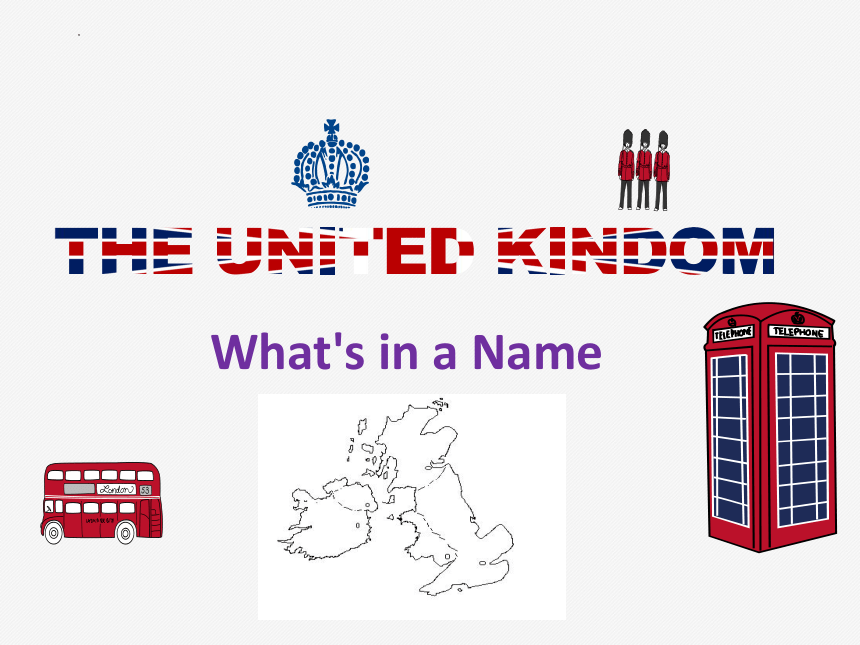
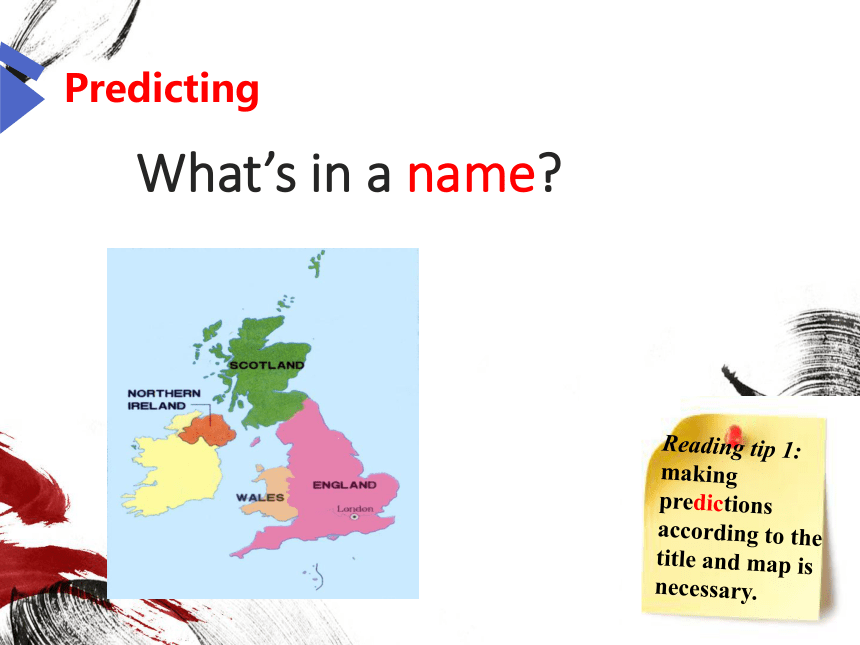
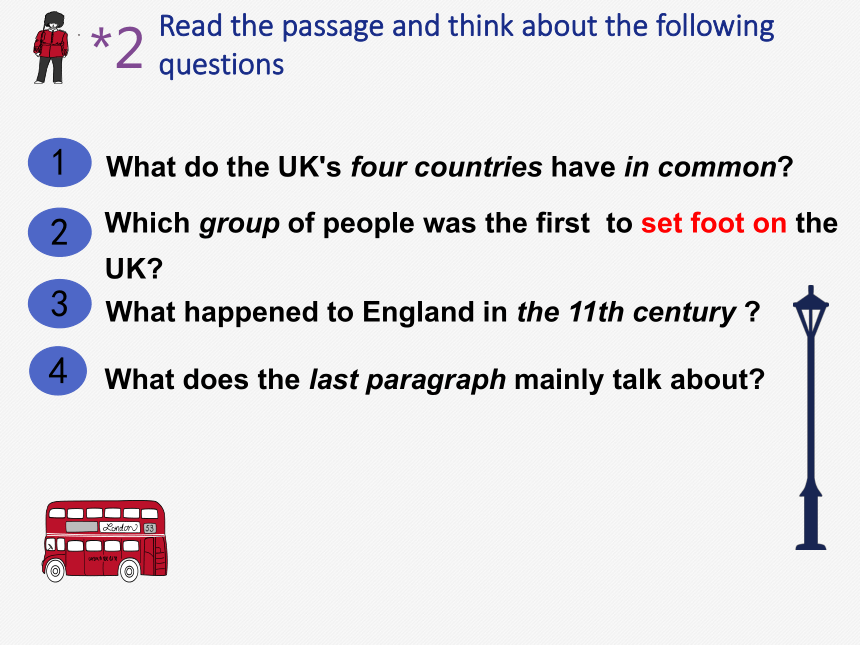
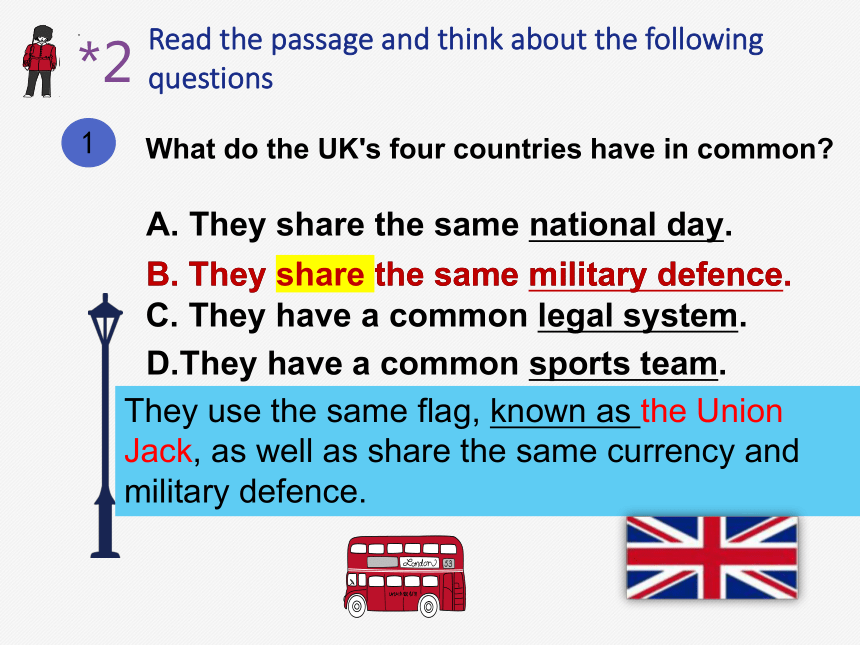
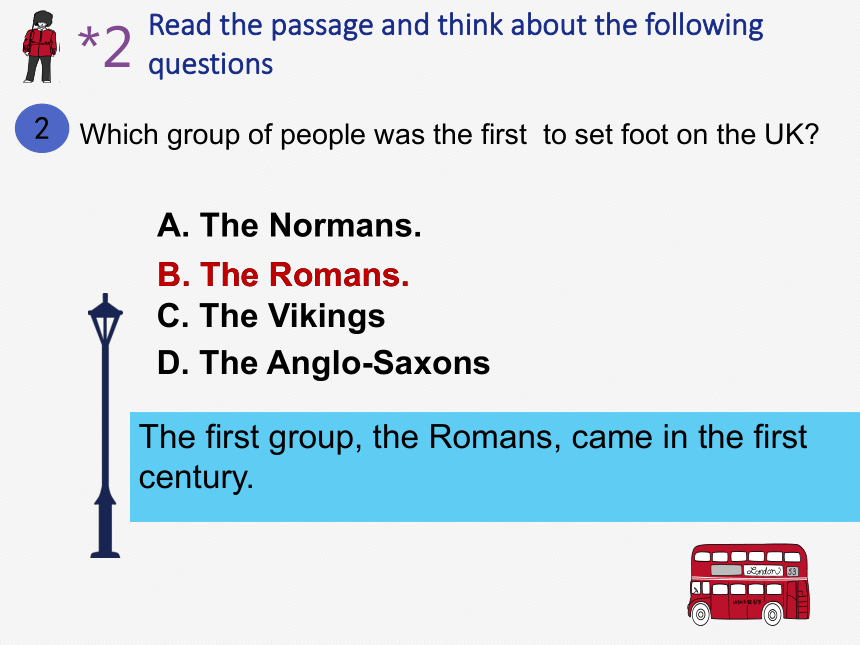
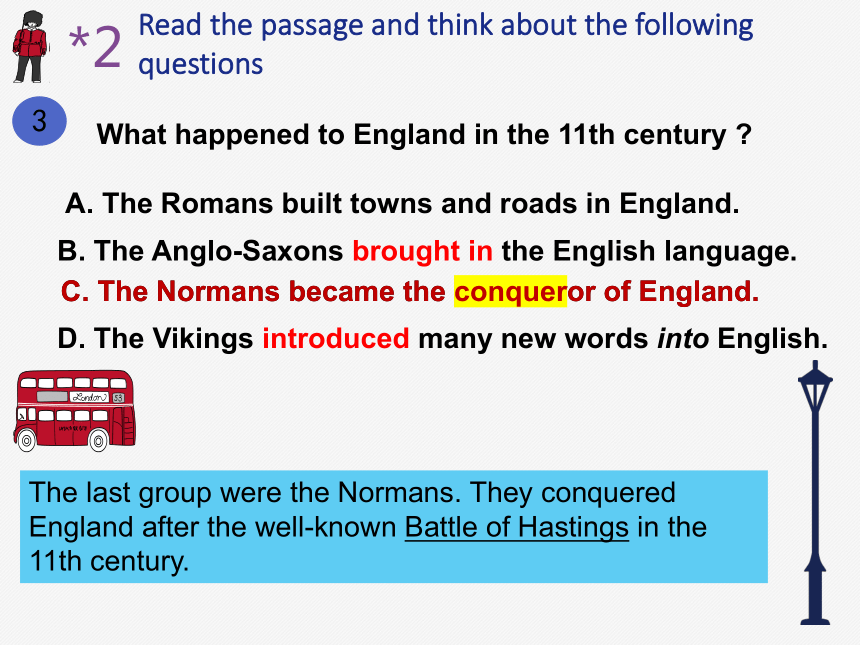
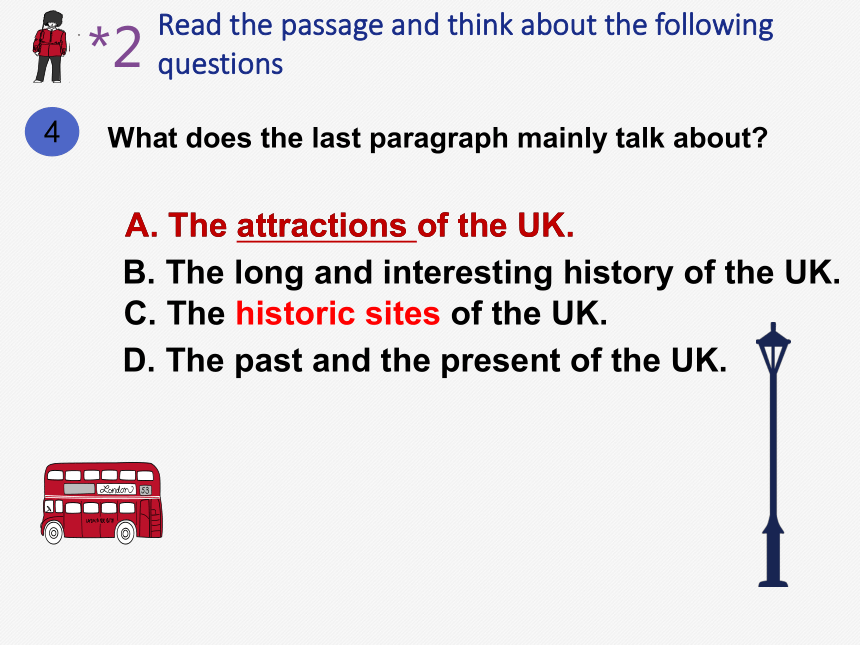
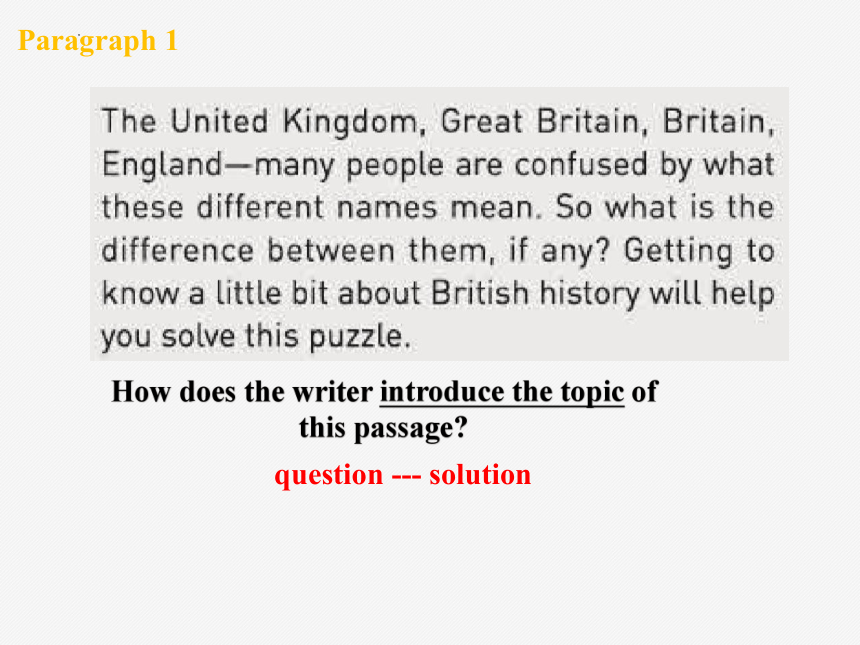
文档简介
(共25张PPT)
History and traditions
THE UNITED KINDOM
What's in a Name
What’s in a name
Predicting
Reading tip 1:
making predictions according to the title and map is necessary.
1
4
3
2
Which group of people was the first to set foot on the UK
What does the last paragraph mainly talk about
What do the UK's four countries have in common
What happened to England in the 11th century
*2
Read the passage and think about the following questions
1
A. They share the same national day.
C. They have a common legal system.
What do the UK's four countries have in common
B. They share the same military defence.
*2
Read the passage and think about the following questions
D.They have a common sports team.
B. They share the same military defence.
They use the same flag, known as the Union Jack, as well as share the same currency and military defence.
2
A. The Normans.
C. The Vikings
Which group of people was the first to set foot on the UK
B. The Romans.
*2
Read the passage and think about the following questions
D. The Anglo-Saxons
B. The Romans.
The first group, the Romans, came in the first century.
3
A. The Romans built towns and roads in England.
C. The Normans became the conqueror of England.
What happened to England in the 11th century
B. The Anglo-Saxons brought in the English language.
*2
Read the passage and think about the following questions
D. The Vikings introduced many new words into English.
C. The Normans became the conqueror of England.
The last group were the Normans. They conquered England after the well-known Battle of Hastings in the 11th century.
4
A. The attractions of the UK.
C. The historic sites of the UK.
What does the last paragraph mainly talk about
B. The long and interesting history of the UK.
*2
Read the passage and think about the following questions
D. The past and the present of the UK.
A. The attractions of the UK.
Paragraph 1
How does the writer introduce the topic of this passage
question --- solution
Para2 History
1. In what order does this paragraph be organized
2. Scan para2 to circle the words that describe time.
In the 16th century
In the 18th century
In the 19th century
In the 20th century
Reading tip2: Scanning is looking at the text quickly to find specific information,such as dates or numbers.
England +Wales
England +Wales
+Scotland
(Great Britain)
Great Britain
+ Northern Ireland
Great Britain
+Ireland
in the 16th century
in the 18th century
in the
19th century
be linked to
be joined to
be added to
How did UK come into being
in the
20th century
break away from
16th century
18th century
19th century
20th century
the Kingdom
of England
the Kingdom
of Great Britain
the United
Kingdom of
Great Britain
and Ireland
the United
Kingdom of
Great Britain
and Northern
Ireland
the United
Kingdom
the UK
different names in the history
A name means______________________________________________.
the change in geography in the history
Puzzle 1
was joined to
was joined to
was added to
broke away from
It's your turn.
Do the four countries work together in all areas
Read Para. 3 and find out similarities and differences between four countries
similarities differences examples
flag
currency
military defence
systems
traditions
sport teams
national days; national dishes
Reading tip3:
Giving examples (for example; like)can help readers understand the point more easily and more convincing.
Further thinking:
How does the writer develop this paragraph
Time Events Changes
1st century
Romans arrived
included towns and roads
5th century
Anglo-Saxons came
introduced English language;
changed the way to build houses
8th century
Vikings came
left behind new vocabulary and
the names of many locations
11th century
Normans came
had castles built;
made changes to legal system;
French words entered
rich culture
a long history
different groups
Puzzle 2
Four groups of people brought different cultures to the country.
A timeline for British history
When What happened What changed
1st century Romans arrived built towns and roads
5th century Anglo-Saxons came English language;
the way people built houses
8th century Vikings new vocabulary;
names of locations
11th century Normans castles; legal system
French words
16th century Wales joined Kingdom of England
18th century Scotland joined Kingdom of Great Britain
19th century Ireland added United Kingdom of Great Britain and Ireland
20th century Southern Ireland broke away United Kingdom of Great Britain and Northern Ireland
Divide the text into Three parts.
Part1(Para.1-3)
Part3(Para.5)
People and traditions
What is the genre(语篇类型) of the text
A.Narration(叙述文) B. Argumentation(议论文) C.Exposition (说明文)
Skimming
Part2(Para.4)
trip
Introduction and history
History and
tradition
nr
Further thinking
Who do you think are the intended readers of this passage, and why
①Studying the history of the country will make your visit much more enjoyable.
②If you keep your eyes open, you will be surprised to find that you can see both its past and its present.
Visitors to the UK
Para1-3
Para 4
Help us understand more about the
country and its traditions
Para5
Make your visit more enjoyable
Help us understand why the UK has many different names
Main idea: The passage mainly talks about advantages of studying British history.
Thinking & Summary:
What can studying the history of the UK help us
A people without the knowledge of their past history, origin and culture is like a tree without roots.
– Marcus Garvey
Appreciating a quote
Situation: you are a tour guide for visitors to the UK, make a brief introduction of British history in four parts:
history of four groups of ruling people;
history of how the UK get its full name
the similarities and differences between four countries nowadays
the significance of studying history
Use key words you underlined
Hello, everyone
Welcome to the United Kingdom of Great Britain and Northern Ireland. It is a country with a long history …
(reference)
Homework
Read the text again and recite the expressions you like.
Finish writing the following letter after class.
One possible version
Dear Jim,
It’s nice to hear from you. I’m writing to share with you some suggestions for your visit to China.
knowing a little Chinese history will be helpful when you visit China. First, it can help you understand a lot about our country and our traditions. Second, it can make your visit much more enjoyable. If you visit China, I recommend Xi’an is a great place to start. It’s an ancient city with an interesting history. There are countless historic sites for you to explore, and lots of museums with ancient items from all over China. If you keep your eyes open, you will be surprised to find that you can see both its past and its present.
Looking forward to your arrival.
Yours,
Li Hua
Thanks!
History and traditions
THE UNITED KINDOM
What's in a Name
What’s in a name
Predicting
Reading tip 1:
making predictions according to the title and map is necessary.
1
4
3
2
Which group of people was the first to set foot on the UK
What does the last paragraph mainly talk about
What do the UK's four countries have in common
What happened to England in the 11th century
*2
Read the passage and think about the following questions
1
A. They share the same national day.
C. They have a common legal system.
What do the UK's four countries have in common
B. They share the same military defence.
*2
Read the passage and think about the following questions
D.They have a common sports team.
B. They share the same military defence.
They use the same flag, known as the Union Jack, as well as share the same currency and military defence.
2
A. The Normans.
C. The Vikings
Which group of people was the first to set foot on the UK
B. The Romans.
*2
Read the passage and think about the following questions
D. The Anglo-Saxons
B. The Romans.
The first group, the Romans, came in the first century.
3
A. The Romans built towns and roads in England.
C. The Normans became the conqueror of England.
What happened to England in the 11th century
B. The Anglo-Saxons brought in the English language.
*2
Read the passage and think about the following questions
D. The Vikings introduced many new words into English.
C. The Normans became the conqueror of England.
The last group were the Normans. They conquered England after the well-known Battle of Hastings in the 11th century.
4
A. The attractions of the UK.
C. The historic sites of the UK.
What does the last paragraph mainly talk about
B. The long and interesting history of the UK.
*2
Read the passage and think about the following questions
D. The past and the present of the UK.
A. The attractions of the UK.
Paragraph 1
How does the writer introduce the topic of this passage
question --- solution
Para2 History
1. In what order does this paragraph be organized
2. Scan para2 to circle the words that describe time.
In the 16th century
In the 18th century
In the 19th century
In the 20th century
Reading tip2: Scanning is looking at the text quickly to find specific information,such as dates or numbers.
England +Wales
England +Wales
+Scotland
(Great Britain)
Great Britain
+ Northern Ireland
Great Britain
+Ireland
in the 16th century
in the 18th century
in the
19th century
be linked to
be joined to
be added to
How did UK come into being
in the
20th century
break away from
16th century
18th century
19th century
20th century
the Kingdom
of England
the Kingdom
of Great Britain
the United
Kingdom of
Great Britain
and Ireland
the United
Kingdom of
Great Britain
and Northern
Ireland
the United
Kingdom
the UK
different names in the history
A name means______________________________________________.
the change in geography in the history
Puzzle 1
was joined to
was joined to
was added to
broke away from
It's your turn.
Do the four countries work together in all areas
Read Para. 3 and find out similarities and differences between four countries
similarities differences examples
flag
currency
military defence
systems
traditions
sport teams
national days; national dishes
Reading tip3:
Giving examples (for example; like)can help readers understand the point more easily and more convincing.
Further thinking:
How does the writer develop this paragraph
Time Events Changes
1st century
Romans arrived
included towns and roads
5th century
Anglo-Saxons came
introduced English language;
changed the way to build houses
8th century
Vikings came
left behind new vocabulary and
the names of many locations
11th century
Normans came
had castles built;
made changes to legal system;
French words entered
rich culture
a long history
different groups
Puzzle 2
Four groups of people brought different cultures to the country.
A timeline for British history
When What happened What changed
1st century Romans arrived built towns and roads
5th century Anglo-Saxons came English language;
the way people built houses
8th century Vikings new vocabulary;
names of locations
11th century Normans castles; legal system
French words
16th century Wales joined Kingdom of England
18th century Scotland joined Kingdom of Great Britain
19th century Ireland added United Kingdom of Great Britain and Ireland
20th century Southern Ireland broke away United Kingdom of Great Britain and Northern Ireland
Divide the text into Three parts.
Part1(Para.1-3)
Part3(Para.5)
People and traditions
What is the genre(语篇类型) of the text
A.Narration(叙述文) B. Argumentation(议论文) C.Exposition (说明文)
Skimming
Part2(Para.4)
trip
Introduction and history
History and
tradition
nr
Further thinking
Who do you think are the intended readers of this passage, and why
①Studying the history of the country will make your visit much more enjoyable.
②If you keep your eyes open, you will be surprised to find that you can see both its past and its present.
Visitors to the UK
Para1-3
Para 4
Help us understand more about the
country and its traditions
Para5
Make your visit more enjoyable
Help us understand why the UK has many different names
Main idea: The passage mainly talks about advantages of studying British history.
Thinking & Summary:
What can studying the history of the UK help us
A people without the knowledge of their past history, origin and culture is like a tree without roots.
– Marcus Garvey
Appreciating a quote
Situation: you are a tour guide for visitors to the UK, make a brief introduction of British history in four parts:
history of four groups of ruling people;
history of how the UK get its full name
the similarities and differences between four countries nowadays
the significance of studying history
Use key words you underlined
Hello, everyone
Welcome to the United Kingdom of Great Britain and Northern Ireland. It is a country with a long history …
(reference)
Homework
Read the text again and recite the expressions you like.
Finish writing the following letter after class.
One possible version
Dear Jim,
It’s nice to hear from you. I’m writing to share with you some suggestions for your visit to China.
knowing a little Chinese history will be helpful when you visit China. First, it can help you understand a lot about our country and our traditions. Second, it can make your visit much more enjoyable. If you visit China, I recommend Xi’an is a great place to start. It’s an ancient city with an interesting history. There are countless historic sites for you to explore, and lots of museums with ancient items from all over China. If you keep your eyes open, you will be surprised to find that you can see both its past and its present.
Looking forward to your arrival.
Yours,
Li Hua
Thanks!
